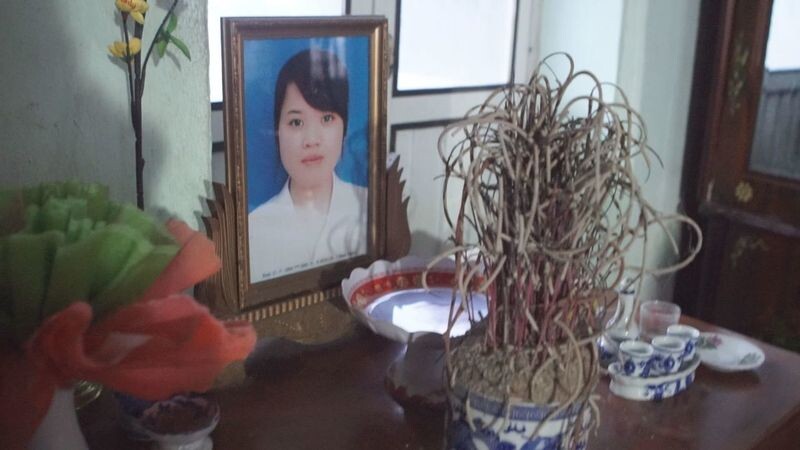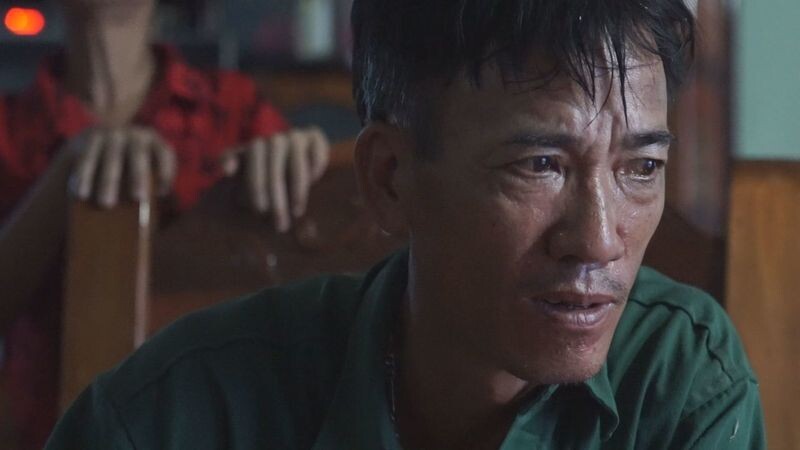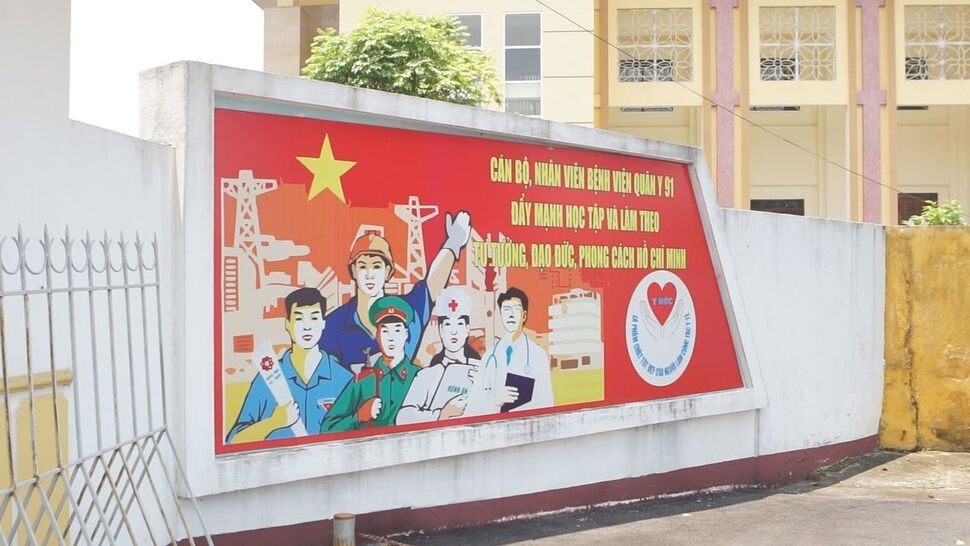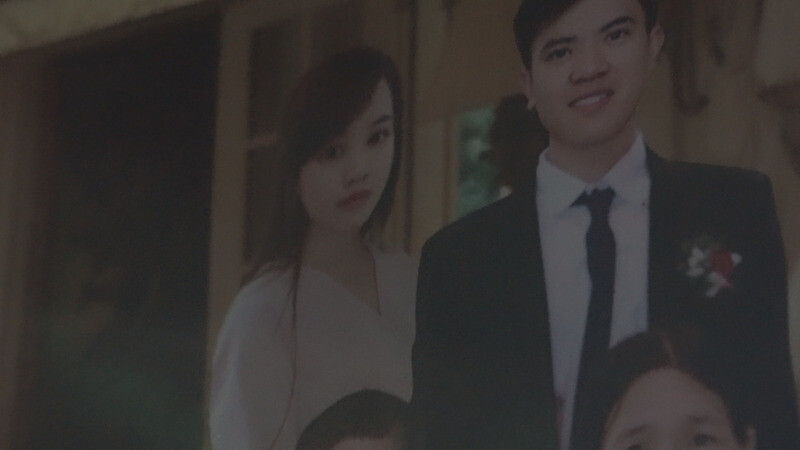hankyoreh
Links to other country sites 다른 나라 사이트 링크
[Special report- Part I] Worked to death at the ripe age of 22
Posted on : 2019-06-23 15:34 KST Modified on : 2019-06-23 15:34 KST
Luu Thi Thanh Tam dreamt of attending college but opted to work for Samsung to support her family

Our 70-day investigation into Samsung’s global footprint turned up unpleasant truths that Koreans have been vaguely aware of but preferred to ignore. We believe that facing up to the truth, as painful as it may be in the short term, is necessary in order to bolster Samsung’s brand value as a global company. This five-part series will be assessing Samsung Electronics’ sustainability as a top-tier global company.

A memorial portrait of Luu Thi Thanh Tam
Luu Thi Thanh Tam, 22 at the time of her death, worked until Aug. 31, 2016, at a Samsung Electronics factory in the Vietnamese city of Thai Nguyen. That day, she suddenly collapsed at her workplace; she was taken to the hospital but passed away shortly afterward. She had been working for Samsung for four months.
“My daughter was very healthy. She received a health examination when she went to work at Samsung, and they said there were no issues. And then all of a sudden she died. Samsung and the police gave us money and told us her death had ‘nothing to do with the factory,’ but that isn’t true. My daughter clearly died because of Samsung.”
Tam’s father Luu Van Tiep, 52, frequently hesitated as he spoke. For long periods, he would stare off into the distance. His gaunt body, with its veins more prominent than muscles, and his darkly tanned skin suggested he had spent many years doing intense labor. The depth of his eyes was particularly striking; when he spoke of his daughter, he would have coughing fits and his pupils would quiver. He described himself as a “country bumpkin who doesn’t know much about the outside world” – but when the topic was Samsung, his words were brief and forceful.

a worker at a Samsung Electronics factory in Thai Nguyen
Working five to six days a week with alternating day and night shifts
Luu had no idea his daughter’s death had been included in a report by an international human rights group. The Hankyoreh was the first news outlet he had been in contact with.
Luu’s last conversation with Tam took place at 2 pm on the day of her death three years ago. “I have a big headache,” she told him. She also happily told him, “I have tomorrow and the next day off and will be coming to see mother.” Luu’s second child was the only one living in the city. She was a good enough student to earn acceptance to law school, but had opted to take a factory job because of her family’s financial state. It was a struggle, but she dutifully dealt with the situation.
Tam left home after graduating high school. She worked as a product inspector at an electronics factory in Hanoi. Mature for her age, she worried about her younger sibling; like others her age, she was interested in makeup. It was only after she died that her father learned of the words she had written in her journal around this time: “I’m making money now, but I want to go to university later and achieve my dream.”
Afterwards, she went to work at Samsung Electronics in the hopes of earning more. Working there, she earned between 8 and 9 million dong (US$343.38-386.31) a month, higher than the average rate of pay for workers at Samsung factories in Vietnam. Factory co-workers explained that the reason she was able to earn so much despite having just gone to work in a contracted position at the company was because she had worked long overtime hours.
“I heard she was working five to six days a week of alternating day and night shifts,” her older brother explained.
“Did she often complain of headaches?”
Just two hours after his last conversation with Tam ended, Luu received another call around 4 pm. It wasn’t her, but a South Korean manager of Samsung Electronics. Luu, who answered the phone, could not remember if the person’s surname was “Ji” or “Park.” The South Korean managers occupied the highest tier at Samsung Electronics’ factories in Vietnam and rarely had cause to speak with local workers. The fact that one of them was contacting the guardian of a local worker was a sign that something very serious had happened at the factory.
“There’s been an issue with your daughter, and she’s being taken to the hospital,” the manager told Luu, before asking, “Did your daughter often complain of headaches?” Luu was too stunned to ask the reason.
Tam’s death is referred to in a report titled “Stories of Women Workers in Vietnam’s Electronics Industry,” published in November 2017 by the international environment and labor group IPEN.
“Ms. Tam was [. . .] taken to the SEVT medical center for examination and treatment. About 4 pm the same day, Ms. Tam [. . .] was taken to the Military Hospital 91 for emergency treatment, but unfortunately died at 17:30 the same day,” the report said.
Autopsy performed without family’s consent
At 6 pm that day, the father was notified that his daughter had died. He recalled hearing the word “autopsy” – the meaning of which he didn’t even know at the time, he said.
“They said they were taking some kind of medical measure. I told them that we were on our own and that they shouldn’t do anything,” he remembered.
Luu could not recall whether it was Samsung or the police who notified him of Tam’s death. But whoever it was definitely mentioned an autopsy. It was a word that was not a part of Luu’s vocabulary.
Tam’s older brother recalled the events clearly.
“In their phone call with my father, they said they were doing to do an autopsy. I was the first member of the family to arrive at the hospital after that, and Samsung and the police immediately started talking about an autopsy again,” he said. Honoring the family’s wishes, the brother refused to allow it. But Samsung and the police had “already decided on an autopsy.” The family hadn’t even been given a moment to grieve the loss of a daughter and sister. Like South Koreans, Vietnamese people view it as taboo to desecrate a dead body. To this day, the family does not understand why an autopsy was the first thing mentioned after their one and only daughter passed away, or why it was performed despite their opposition.
“From the fact that they proposed an autopsy immediately after her death, and that they used the threat of police to proceed with it in spite of the family’s objections, suggests there was something about the death they wanted to conceal,” said Cho Seung-gyu, a labor attorney whose cases have mainly involved industrial accidents at Samsung in South Korea.
“When one of their factory workers dies, Samsung responds in a way that makes the cause of death into an issue with no direct relation to the factory,” Cho explained.
Police says death is “unrelated to factory”
When Tam’s family members arrived at her funeral, the police told them her death “had nothing to do with the factory.”
“She was just unlucky,” they were told.
Thirty minutes after the autopsy was completed, a Samsung employee arrived with a purchased coffin. The undertaker who sold the coffin was the reason her death became known to the rest of the world. In a social media message, the undertaker wrote, “Someone bought a coffin after a person died at the Samsung factory.” The message was deleted shortly afterwards.
Tam was buried in her hometown; her possessions were burned in accordance with Vietnamese custom. On Sept. 7, 2016, after all of the funeral procedures had been completed, an unnamed Samsung official gave an interview with a local news outlet in Vietnam.
“Tam was employed on a two-year contract and had been working at Samsung for four months. Her main duties involved transporting employees’ clothing and uniforms at the factory’s cleanroom,” the official explained.
On Oct. 6, Vietnamese police told the local press that Tam had died of myocarditis. The Research Centre for Gender, Family and Environment in Development (CGFED), a women’s environmental and labor rights group in Vietnam, learned from police that Tam had collapsed with a headache while working in the Samsung Electronics Thai Nguyen factory cleanroom; she was taken to Military Hospital 91 for emergency treatment, but passed away around 5:30 pm. The autopsy found no toxic substances, police reported.

The military hospital in Thai Nguyen where Tam was pronounced dead. The doctor the Hankyoreh spoke to declined to speak bout Tam’s death.
Military hospital refuses to issue a death certificate
But the surviving family still had doubts that weren’t cleared up by the police investigation. When Tam’s older brother asked the doctor for a death certificate, his request was rejected. The doctor told him there wasn’t a death certificate, but that the presumed time of death was 5 pm — 30 minutes earlier than the time officially announced by the police. It wasn’t even clear whether the death had occurred at the hospital or in the factory. In a meeting with the Hankyoreh, a representative from Military Hospital 91 in Thai Nguyen shared no details about Tam’s death. “There’s nothing we can tell you about the death of the worker at the Samsung factory,” the representative said.
When Tam was hired by Samsung, she received a health checkup, and nothing was amiss. Then she died at the factory, just four months later. What could have been the cause? According to South Korea’s reference sheet for workplace accidents, the heart condition known as myocarditis is caused by overwork and stress. It can also be caused by exposure to toxins or by a viral infection. When a worker at a South Korean semiconductor factory died of acute myocarditis after working 70 hours a week, their death was officially recognized as having been work-related. Based on statements from Tam’s family and on the amount of money she’d wired home, she appeared to have been working between 60 and 70 hours a week. Since she was working back-to-back day and night shifts, she was presumably suffering from long hours on an irregular schedule. She could conceivably have died from overwork.
Potential death from overwork or exposure to harmful substances
Samsung’s explanation that Tam’s job was transporting clothing in the cleanroom is notable, too. The cleanroom is a part of the factory where particulate matter is suppressed in order to lower the defective product rate. The air is poorly ventilated there, as part of efforts to manage dust levels. Volatile organic compounds, which are carcinogenic, remain in the cleanroom longer than in other areas. Tam could have been exposed to such compounds.
Transporting clothing is a job in which workers are vulnerable to indirect exposure to chemicals and contaminated materials, even when the worker doesn’t use those materials directly. Such concerns have already been borne out in experiments in cleanrooms in semiconductor plants in South Korea. A study by the South Korean Occupational Safety and Health Research Institute in 2012 found that when the harmful materials released during the production process are reintroduced or retained in the cleanroom because of recirculation equipment, they can turn into secondary carcinogenic byproducts. There are even reports that a worker at a clothing store who was removing the plastic wrapping from clothing before sorting it suffered health problems because of toxic chemicals smeared on the clothing during the production process. A Samsung document acquired by the Hankyoreh that contains work-related measurements at mobile phone factories in South Korea states that several harmful chemicals classified as carcinogens are used in cleanrooms at mobile phone factories. It’s possible that the anti-static garments that Tam was transporting were chemically contaminated as well. Experts pointed out that many organic solvents or chemical products are also likely used to repel dust and prevent static electricity when the cleanroom garments are being laundered.
Since Tam, as a high school graduate, was better educated than other workers and since she also had experience working at electronic factories, it’s also possible that her work involved something other than picking up clothing. “Samsung puts even probationary workers on the production line to do the same work as its regular workers. It doesn’t make sense that someone who’d been officially hired with a contract at Samsung would have just been organizing clothing,” said experts who have researched the Samsung issue.

Tam’s brother photoshopped an image of Tam into his wedding photograph.
Reparations paid Samsung’s signature hushed and unofficial way
Even though three years have gone by since Tam’s death, her father still has trouble believing it. The family hasn’t even cleared out her things. The father suspects that her sudden death was brought on by toxic substances, and her older brother thinks the same thing: “They said she was handling chemicals, and that’s probably what killed her. I still want to know the exact cause of her death.”
Tam’s family didn’t get a decent explanation about her death from Samsung, and they didn’t get an apology either. Following the funeral, the bereaved family met with a Samsung employee, surnamed Ji, who informed them that the company would be paying them 200 million dong (US$8,585). Ji explained that they would be given two payments of 100 million dong each.
According to Vietnamese labor law, the family of a worker who dies on the job is supposed to be paid one year’s wages if the death is not recognized as being work-related and three years’ wages if it is. The amount that Samsung offered was worth two years’ worth of Tam’s wages, leaving it unclear whether Samsung considered the death work-related or not.
“Trying to erase the very incident is typical Samsung behavior,” said Lee Jong-ran, a labor attorney with an NGO called Banollim and a longtime activist for medical conditions connected to work at Samsung factories in South Korea.
“They keep the incident under wraps by promising a monetary payment and preventing leaks to the outside. Payments are sometimes delayed in South Korea, too. Sometimes, they’re siphoning off a little money at a time from business expenses to avoid creating a separate entry for compensation,” Lee said.
Electronics industry the most secretive of them all
A long struggle by activists including Hwang Sang-gi —father of Hwang Yu-mi, a worker at a Samsung semiconductor factory in Giheung, South Korea, who died of leukemia — has created public awareness of the dangers of the semiconductor industry, which was once presented as a squeaky-clean cutting-edge industry. One of the facts that came out during that process is that the cleanroom isn’t clean for workers, but is rather a place where they’re exposed to various chemicals that are used to keep products from being contaminated. While Samsung has agreed to provide compensation and apologize for deaths resulting from leukemia and other conditions contracted by workers at its semiconductor factories, it still refuses to acknowledge that those conditions were caused by its factories. The company has also declined to publicly reveal the chemicals being used there.
“The electronics industry is the most secretive of all,” said Ted Smith, an activist with the International Campaign for Responsible Technology, which aims to tackle hazards in the electronics industry.
Hankyoreh reporters posed many questions to Samsung about Tam’s death and about the health of workers at its factories. “We’re constantly reviewing our workplaces to ensure they’re safe places for all our employees and that their personal value and rights will be respected. When shortcomings turn up, we will take thorough measures to address and monitor them,” Samsung said.
By Kim Wan and Lee Jae-yeon, staff reporters
Please direct comments or questions to [english@hani.co.kr]
광고
Editorial・opinion
![[Guest essay] Amending the Constitution is Yoon’s key to leaving office in public’s good graces [Guest essay] Amending the Constitution is Yoon’s key to leaving office in public’s good graces](https://flexible.img.hani.co.kr/flexible/normal/500/300/imgdb/original/2024/0416/8917132552387962.jpg) [Guest essay] Amending the Constitution is Yoon’s key to leaving office in public’s good graces
[Guest essay] Amending the Constitution is Yoon’s key to leaving office in public’s good graces![[Editorial] 10 years on, lessons of Sewol tragedy must never be forgotten [Editorial] 10 years on, lessons of Sewol tragedy must never be forgotten](https://flexible.img.hani.co.kr/flexible/normal/500/300/imgdb/original/2024/0416/8317132536568958.jpg) [Editorial] 10 years on, lessons of Sewol tragedy must never be forgotten
[Editorial] 10 years on, lessons of Sewol tragedy must never be forgotten- [Column] A death blow to Korea’s prosecutor politics
- [Correspondent’s column] The US and the end of Japanese pacifism
- [Guest essay] How Korea turned its trainee doctors into monsters
- [Guest essay] As someone who helped forge Seoul-Moscow ties, their status today troubles me
- [Editorial] Koreans sent a loud and clear message to Yoon
- [Column] In Korea’s midterm elections, it’s time for accountability
- [Guest essay] At only 26, I’ve seen 4 wars in my home of Gaza
- [Column] Syngman Rhee’s bloody legacy in Jeju
Most viewed articles
- 1[Column] A death blow to Korea’s prosecutor politics
- 2[News analysis] Watershed augmentation of US-Japan alliance to put Korea’s diplomacy to the test
- 3[Guest essay] How Korea turned its trainee doctors into monsters
- 4‘National emergency’: Why Korean voters handed 192 seats to opposition parties
- 5[Photo] Cho Kuk and company march on prosecutors’ office for probe into first lady
- 6[Column] A third war mustn’t be allowed
- 7[Editorial] New KBS chief is racing to deliver Yoon a pro-administration network
- 8[Editorial] S. Korea should take a note from US-China tactical compromise
- 9[Column] Down with the so-called social ladder
- 10Exchange rate, oil prices, inflation: Can Korea overcome an economic triple whammy?